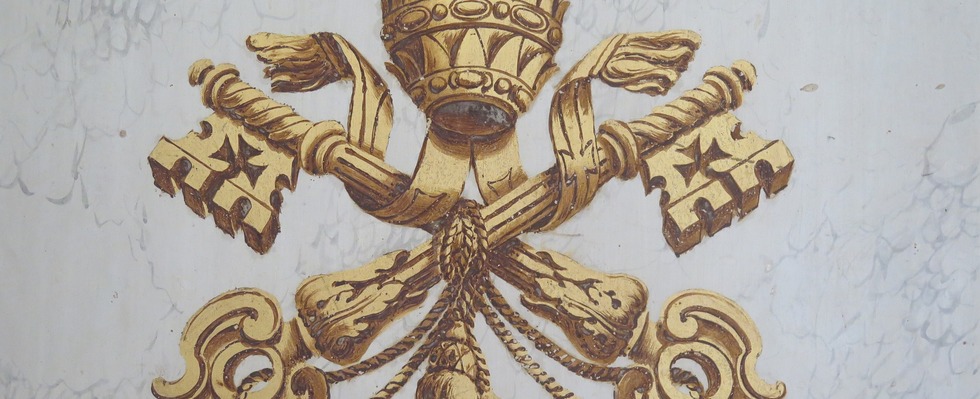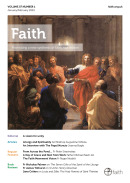Diplomacy and Mission
Joanna Bogle meets the Pope’s representative in Britain.
Visiting the Apostolic Nunciature on a dark winter’s afternoon begins as a rather intimidating experience. The magnificent Victorian house – it was owned by a Catholic family who donated it to the Church – fronts on to Wimbledon Common, thickly wooded and silent, famous for highwaymen and their modern equivalents. The 93 bus trundles along, with most people getting off at Wimbledon Village and new travellers generally not getting on until nearer Putney.
The big gates are firmly shut, but after pressing a buzzer and getting a friendly reply I find them gently opening, and the imposing front door is duly opened by a smiling nun and I am in a warm panelled hall, with a reassuring picture of the Queen and an atmosphere that is welcoming and almost cosy.
His Excellency is delayed at a meeting, but this gives me an opportunity not only for some delicious tea in the very comfortable sitting room (pics of St John Paul II, Pope Benedict, and the present Holy Father, glass-topped table with display of commemorative coins and things, sofa and armchairs with deep squashy cushions) but also to pray in the simple but beautiful chapel with its glowing sanctuary lamp and glorious picture of the Assumption. Then there is a car drawing up and Archbishop Claudio Gugerotti is greeting me in the hall and what I might have expected to be a rather formal structured interview turns out to be a frank, fascinating and extremely enjoyable conversation.
I begin by asking about his impressions of Britain: This turns out to be a silly question as he first visited as a teenager, studied here at some length, returned regularly for years, and knows the country well. His work for the Church then took him to the former Soviet Union where he served for some twenty years. “Then when I came back to England it was shut,” he says. Being appointed as Nuncio in lockdown was a strange experience. “Nothing was happening. I had to stay in the house. I spoke to the squirrels. The diplomatic world simply closed down because of Covid. That was that.”
But, at least within the Church, in recent months things have opened up and there are events and activities – he had spent that afternoon at a Catholic school and, of course, there have been meetings with Bishops. And he was the speaker a few days earlier at the Festival celebrating the 10th anniversary of the Ordinariate of Our Lady of Walsingham in Westminster Cathedral Hall. His take on this subject is interesting. “We need to seek what can be shared from the Anglican patrimony: God did not shut the door on all those people in the Anglican communion for 300 years. There were saints among them, enriched by particular traditions, with deep spiritual roots. There’s a real patrimony, a spiritual heritage. If we pay attention to that, there’s a future.” He’s unimpressed with attempts to squeeze the Ordinariate into something it should not be: “It’s not a case of trying to revive, say, the Catholic Church of a hundred years ago. That’s not the point at all.”
Looking at the wider scene, the issues facing a representative of the successor of St Peter in today’s West certainly involve a clash of cultures. “I’m a warrior,” he admits, “I hope a warrior with a smile, but a warrior. Why should I hide the faith? I want to be truthful, not necessarily to be popular.” He sees in today’s West something that echoes with the caution, mistrust and awkwardness that dominated life in post-Communist countries. “I worked in the former Soviet Union. Years after the fall of communism there were still all these phobias. It’s something that you then recognise elsewhere.”
One of the current phobias in the West is certainly the Church. “People have a certain idea of the Church: but it’s a theatrical image, a parody, not the real thing. When you are able to have a real conversation, then they can discover the truth. And I’m not afraid of a good discussion.”
One gets the impression he might be encouraged to work with Bishops who share a similar sense of readiness for a vigorous approach. He believes this is a time for evangelisation. He relishes discussion about evangelistic projects. “Cardinal Ruini, in Rome, announced a special month when all the churches were open throughout the night, for prayer and for confession. And people came. They would be out and about in the city and they dropped in to the churches lit up with candles. There were huge numbers of confessions. It took the Church by surprise, but it shouldn’t. We need to be missionary: it isn’t just a matter of opening up for one morning Mass each day.”
Public witness also includes priests wearing clerical dress, and religious wearing habits. “It won’t do to walk about in disguise. People want to see priests, to be aware of the Church.” Asked about vocations to the priesthood he is emphatic that this is also a matter of being attracted to something important and valuable, “It’s something that has to be clear, and something that you see and admire, something that attracts. I remember, long ago, that I wanted to be like my parish priest. When I look back, that’s how I began to think about it, about the priesthood.”
He’s not impressed with clergy who want to remain within a comfort zone of their own making. “Just carrying on within an understood frame of not getting involved with anything challenging: that’s all too common. I’m afraid there is perhaps rather too much of that.”
The Britain he first encountered as a teenager has certainly changed - “For one thing, it was always tea – but now you all drink coffee” – and he sees some strengths, including the genuine self-deprecating humour that can still sometimes be found. He was, along with the Pope, touched by Prince Charles’ attendance at the canonisation of St John Henry Newman: “It was something that very much impressed us all.” But he’s realistic about the challenges facing the Church today, the hostility that many Bishops fear and the knowledge that attitudes towards Christianity are not favourable. We talk about child abuse, about the internet and how news and stories – true and false – whiz around the world.
I’m left with the impression of a man who is very realistic about Britain and about the Church, who loves his faith, who has an upbeat attitude to life, and who – assuming COVID doesn’t re-emerge to lock him in again – looks forward to his work in London. I think he’s also a man not easily intimidated, and who thinks that others who are working for the Lord shouldn’t be either. I enjoyed meeting our Papal Nuncio.






